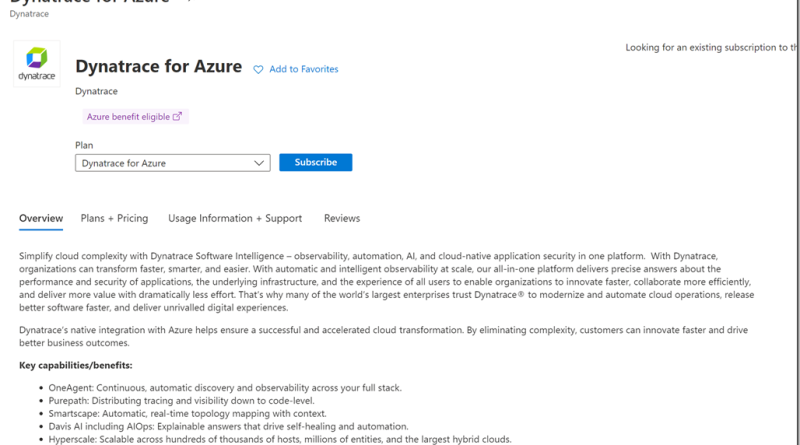Achieve seamless observability with Dynatrace for Azure
This blog post has been co-authored by Manju Ramanathpura, Principal Group PM, Azure DevEx & Partner Ecosystem.
As adoption of public cloud grows by leaps and bounds, organizations want to leverage software and services that they love and are familiar with as a part of their overall cloud solution. Microsoft Azure enables customers to host their apps on the globally trusted cloud platform and use the services of their choice by closely partnering with popular SaaS offerings. Dynatrace is one such partner that provides deep cloud observability, advanced AIOps, and continuous runtime application security capabilities on Azure.
“Deep and broad observability, runtime application security, and advanced AI and automation are key for any successful cloud transformation. Through the Dynatrace platform’s integration with Microsoft Azure, customers will now have immediate access to these capabilities. This integration will deliver answers and intelligent automation from the massive amount of data generated by modern hybrid-cloud environments, enabling flawless and secure digital interactions.”—Steve Tack, SVP Product Management, Dynatrace.
Modern cloud-native environments are complex and dynamic. When failures occur, development teams need deep visibility into the systems to get to the root cause of the issues and understand the impact of potential fixes. Good observability solutions such as Dynatrace for Azure not only enable you to understand what is broken, but also provide the ability to proactively identify and resolve issues before they impact your customers. Currently, if you want to leverage Dynatrace for observability, you go through a complex process of setting up credentials, Event Hubs, and writing custom code to send monitoring data from Azure to Dynatrace. This is often time-consuming and hard to troubleshoot when issues occur. To alleviate this customer pain, we worked with Dynatrace to create a seamlessly integrated solution on Azure that’s now available on the Azure Marketplace.
Dynatrace’s integration provides a unified experience with which you can:
- Create a new Dynatrace environment in the cloud with just a few clicks. Dynatrace SaaS on Azure is a fully managed offering that takes away the need to set up and operate infrastructure.
- Seamlessly ship logs and metrics to Dynatrace. Using just a few clicks, configure auto-discovery of resources to monitor and set up automatic log forwarding. Configuring Event Hubs and writing custom code to get monitoring data is now a thing of the past.
- Easily install Dynatrace OneAgent on virtual machines (VMs) and App Services through a single click. OneAgent continuously monitors the health of host and processes and automatically instruments any new processes.
- Use single sign-on to access the Dynatrace SaaS portal—no need to remember multiple credentials and log in separately.
- Get consolidated billing for the Dynatrace service through Azure Marketplace.
“Microsoft is committed to providing a complete and seamless experience for our customers on Azure. Enabling developers to use their most loved tools and services makes them more productive and efficient. Azure native integration of Dynatrace makes it effortless for developers and IT administrators to monitor their cloud applications with the best of Azure and Dynatrace together.”—Balan Subramanian, Partner Director of Product Management, Azure Developer Experiences.
Get started with Dynatrace for Azure
Let’s now look at how you can easily set up and configure Dynatrace for Azure:
Acquire the Dynatrace for Azure offering: You can find and acquire the solution from the Azure Marketplace.
Create a Dynatrace resource in Azure portal: Once the Dynatrace solution is acquired, you can seamlessly create a Dynatrace resource using the Azure portal. Using the Dynatrace resource, you can configure and manage your Dynatrace environments within the Azure portal.
Configure log forwarding: Configure which Azure resources send logs to Dynatrace, using the familiar concept of resource tags.
Install Dynatrace OneAgent: With a single click, you can install Dynatrace OneAgent on multiple VMs and App Services.
Access Dynatrace native service for Azure with single sign-on: Use the single sign-on experience to effortlessly access dashboards, Smartscape® topology visualization, log content, and more on the Dynatrace portal.
Next steps
- Subscribe to the preview of Dynatrace’s integration with Azure available in the Azure Marketplace.
- Learn more about the Dynatrace integration.
Source: Azure Blog Feed





